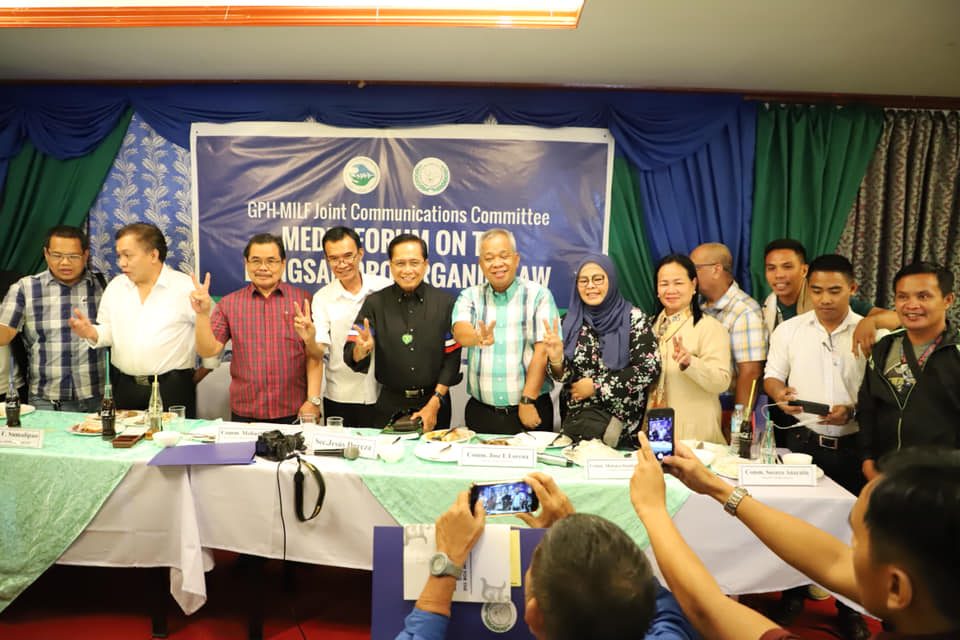SUMMARY
This is AI generated summarization, which may have errors. For context, always refer to the full article.

MANILA, Philippines – Government officials and leaders of the Moro Islamic Liberation Front (MILF) urged the public to unite and take part in the plebiscite to ratify the landmark Bangsmaro Organic Law (BOL) in January 2019.
“The BOL is for the welfare not only of the Bangsamoro people but (also of) non-Muslims residing in the Bangsamoro areas…. The BOL is a formula for peace, development, and progress,” MILF peace panel chair Mohagher Iqbal said in a statement Thursday night, December 6.
The campaign period for the plebiscite started Friday, December 7, and will end on January 19, 2019.
The law seeks to abolish the Autonomous Region in Muslim Mindanao (ARMM) and replace it with the Bangsamoro Autonomous Region in Muslim Mindanao (BARMM), which would have greater fiscal autonomy, a regional government, parliament, and justice system.
Voting is scheduled to take place on two dates. The first will be on January 21, 2019 in ARMM, Cotabato City, and Isabela City. The second voting for Lanao del Norte, North Cotabato, and local government units that petitioned to be included will take place on February 6, 2019.
‘For all, inclusive’
Iqbal was joined by former presidential adviser on the peace process Jesus Dureza, who echoed the MILF leader’s sentiments. He said the BOL was not only for Moros, but was “for all and is inclusive.”
“We should continue to support this effort…if we don’t get this last chance with President [Rodrigo Duterte] we may never have it again in the future,” Dureza said.
Despite resigning from his post last month, the former chief peace adviser gave assurances that he would continue to support peace processes in the country in his “personal capacity.”
The BOL is the culmination of a peace deal signed between the MILF and past administrations. It also builds upon the gains of previous Moro peace agreements since the 1970s. (DOCUMENT: Bangsamoro Organic Law)
Former president Benigno Aquino III had wanted it passed before he stepped down, but a botched police operation in Mamasapano, Maguindanao, in 2015 derailed its passage.
Taking chances: Members of the Bangsamoro Transition Commission (BTC) also rallied for the law and said residents in Bangsamoro areas should “give the BOL a chance.”
“The BOL will put an end to the conflict dahil nagkasundo ang mga revolutionary movements (because revolution movements are in agreement with it). It will put an end to the marginalization that we have and it will provide an effective governance for the region,” BTC Commissioner Jose Lorena said. (READ: MNLF faction reiterates support for Bangsamoro Organic Law)
BTC Commissioner Maisara Dandamun-Latiph said the BOL was not just a piece of legislation but a “peace document.” (READ: Bangsamoro law to be ‘vaccine’ vs terrorism)
The landmark law is being questioned in court.
Governor Abdusakur Tan II of Sulu filed the first Supreme Court petition to block the law, citing questions on constitutionality.
During the campaign period, the BTC and MILF face the challenge of making sure people understand and accept the new law.
Otherwise, the BOL may fail to get enough votes in the plebiscite, sending years’ worth of negotiations and legislative work down the drain. (READ: After Bangsamoro law, a bright yet bumpy path to peace)
Voting in: Based on the law, the region would be initially composed of the current ARMM – Tawi-Tawi, Sulu, Basilan, Maguindanao, and Lanao del Sur – pending a regional plebiscite.
Also included in the Bangsamoro region are 6 municipalities of Lanao del Norte and 39 barangays of North Cotabato, provided that the province and their municipalities, respectively, vote to lose jurisdiction over them. These areas previously voted to be included in the ARMM during the 2001 plebiscite under Republic Act No. 9054, but their mother units voted against it.
Neighboring local government units of the proposed new region may apply for voluntary inclusion. – Rappler.com
Add a comment
How does this make you feel?
There are no comments yet. Add your comment to start the conversation.